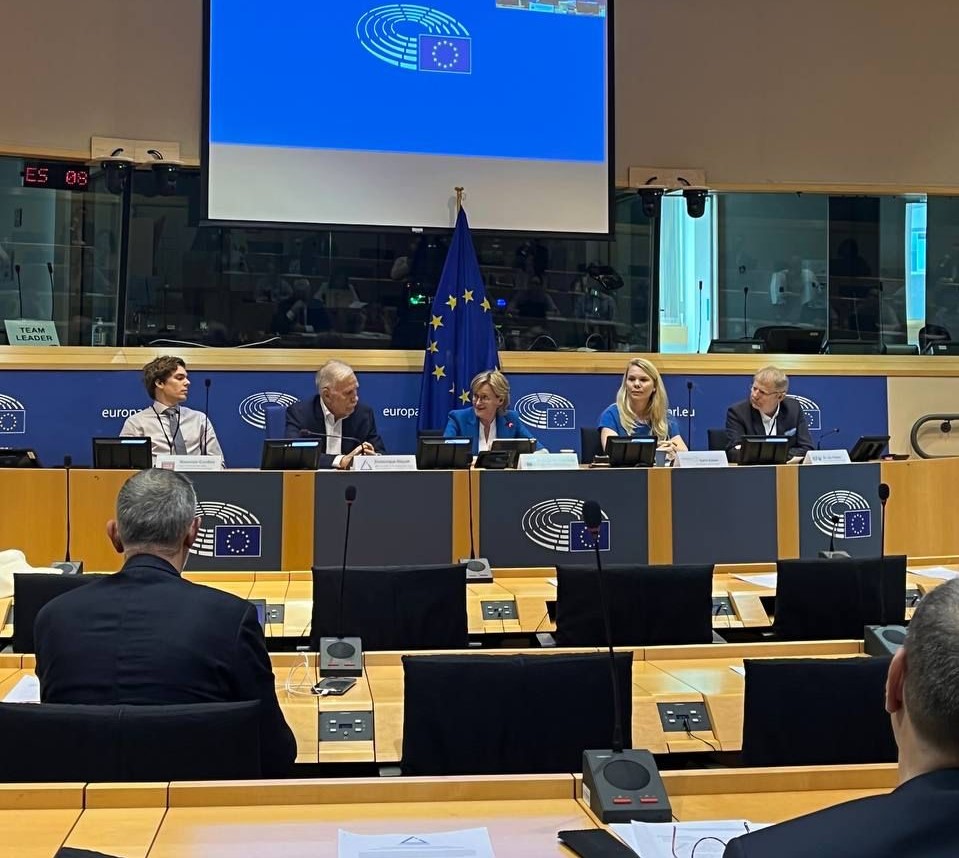How to mobilise investments in clean energy infrastructures?
On Tuesday 12th of July 2022, the Sustainable, Long-term investments & Competitive European Industry Intergroup in the European Parliament held its conference on « How to mobilise investments in clean energy infrastructures ?». Chaired by MEP Dominique Riquet and overseen by Commissioner Mairead Mc Guinness, this event focused on the main obstacles to investment and the solutions to be brought from a financial, regulatory and political perspective, to meet the ambitious objectives of the EU Green Deal and reinforce the resilience of the EU in an increasing uncertain geopolitical context. The panel discussion was moderated by Rebecca Christie, Visiting researcher fellow at the think tank Bruegel.

From left to right: Maxence Cordiez, Dominique Riquet, Mairead Mc Guinness, Karin Kaiser and Dr. Jan Klasen, at the conference of the Sustainable, Long-term investments & Competitive European Industry Intergroup “How to mobilise investments in clean energy infrastructures”, 12th of July, European Parliament.
- MEP and Co-Chair Dominique Riquet opened this high-level conference by welcoming the return of the Intergroup in person format. He recalled that massive investments are essential to meet the challenge of energy sovereignty in the EU, in particular via renewable sources, to cope with the evolution of energy prices which have massive effects on the agriculture, industry and transport sectors. He insisted on the importance to develop a coordinated European approach to energy infrastructure and financing combining public and private resources to fund the necessary investments.
- As part of the event’s keynote speech, Mairead McGuinness, Commissioner in charge of Financial Services, Financial Stability and Capital Markets Union, has recalled the European Union’s vulnerability to fossil fuels, exacerbated by the war in Ukraine. The solution to this dependance is to produce renewable energy in particular solar, wind, green hydrogen, and biomethane, to increase energy efficiency and to decarbonize our energy system, as outlined by the EU Green Deal and the RePowerEU action plan. To increase investments in clean infrastructures, several levers are to be used :
- Direct private financing towards these investments with the help of the EU Taxonomy,
- Foster a deeper and more integrated capital markets Union. It will be important to mobilise individual savings,
- Large investors and insurance companies should also be able to support these investments (this is the objective of the Solvency II reform to promote increased long term investment).
- Dr. Jan Klasen, First Vice President and Head of KfW’s Equity Investments & and European Affairs Division at KfW insisted on the role to play by national promotional banks and institutions (NPBIs) to allow the mobilization of investments to accelerate the transition and increase the EU’s resilience. As such, the KfW relies on two main types of interventions : on-lending (general financing) and promotional programs, which define ex-ante conditions for benefitting from financing. He also mentionned that NPBIs can attract private investors by being anchor investors – as public spending alone cannot meet the massive needs in the long term.
- The Head of European public affairs at CEA, Maxence Cordiez, recalled that 80% of the energy used at European level comes from fossil fuels. This model needs to be changed for two reasons: the Climate Change and the depletion of fossil resources. For that, there is a need for increasing our production of renewable energy, but also to reach for a stable energy such as nuclear. The EU will also have to identify its dependencies on raw materials now to prevent from creating new dependencies in the future.
- Karin Kaiser, Portfolio Manager at Greencoat Capital outlined the main challenges private investors are confronting to accelerate investment in clean energy, in particular inflation (that affects the valuation of projects), high interest rates that increase the cost of capital, the increased difficulty to resort to market-based solutions (rather than subsidies and guarantees) because of the uncertainty of energy prices, and the regulatory environment which requires too high capital requirements on illiquid assets.
To conclude, Laurent Zylberberg, Chair of the European Long-Term Investors Association (ELTI) and Senior Executive Vice-President of Public and International Affairs at Caisse des Dépôts et Consignations insisted on the interdependency between public and private investment which are both necessary to reach the Green deal objectives. In that context, NPBIs have a specific role to play as they can provide incentives to allow the shift the EU energy system. To maximize the effect of public spending, subsidies and financial instruments should work hand in hands. Finally, Laurent Zylberberg underlined the essential role of energy sobriety in achieving these goals.
Contact:
Caroline François-Marsal, secretariat@investmentindustryintergroup.eu
